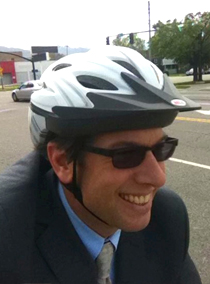Measuring & Doing The Right Things In The Era Of Driverless Cars: Creating Smart, Livable, & Equitable Streets And Cities With Autonomous Vehicles

Since the beginning of modern planning, images, illustrations, and diagrams have been used to conceptualize ideas, evaluate performance, and guide approaches. In the 1970s and ‘80s, a seminal transit performance evaluation framework was developed at UCI by Professor Emeritus Gordon “Pete” Fielding that is still used to this day.
Dr. Appleyard builds on this work, and will present a performance evaluation framework to guide the future of autonomous vehicles toward sustainability, livability, and equity. It does this by prioritizing the measurement of the movement of people above the movement of vehicles, and by integrating land use with transportation policies. The goal is to realize two overarching objectives:
- More vehicle sharing (lowering vehicle trips)
- Less sprawl (shortening trip distances)
Dr. Appleyard will also outline key principles and steps toward more sustainable, livable, & equitable autonomous vehicle futures for our streets and communities.
Dr. Appleyard is an Associate Professor of City Planning/Urban Design at San Diego State University (SDSU) where he helps people and agencies to make more informed decisions about how we live, work and thrive. He is a renowned expert on street design, the future of transport, as well as how to integrate transportation, land use, and urban design to help places become more sustainable, livable and equitable. He is an author of numerous articles, reports, and books.
He has also recently developed an online Smart Growth/Livability Calculator to help the people of California with development challenges, from Climate Action Planning to Housing. The Robert Wood Johnson Foundation named Dr. Appleyard as one of their Top Ten Active Living Heroes for his work with communities. Dr. Appleyard holds a Doctorate (as well as a Masters and Bachelors) from the University of California, in the town of Berkeley where he grew up.